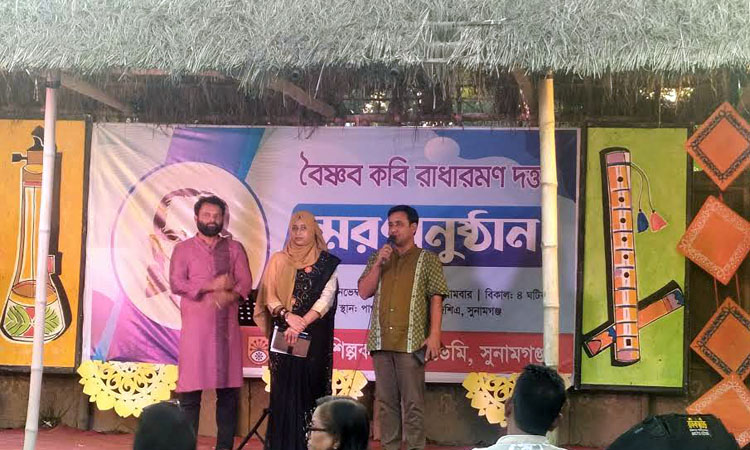News Flash
News Flash

SUNAMGANJ, Nov 10, 2025 (BSS) - A memorial meeting was held today in Sunamganj district, marking the 110th death anniversary of mystic and Vaishnava poet Radhamaman Dutta.
Sunamganj District Shilpakala Academy organised the event on its Baul Chattar premises at 4:30 pm.
District Cultural Officer Ahmed Manjurul Pabel presided over the meeting. Assistant Professor Zakir Hossain of Sunamganj Government College, President of Sunamganj Press Club Principal (Retd.) Shergul Ahmed, Baul researcher Subash Uddin, and President of the District Baul Association Tashkir Ali spoke at the event.
Gias Chowdhury of Theatre Sunamganj conducted the proceedings.
Speakers at the programme said that Radharaman Dutta’s Dhamail songs are widely admired not only in this region but also across the country.
His songs beautifully portray the divine love, separation, reconciliation, and affection between Radha and Krishna, they said.
Among his many popular songs, “Bhramar Koiyo Giya (Koiyo)/Amare Asibar Kotha Koiya (Koiya)” remains one of the most beloved, they said.
They further said that Radharaman Dutta’s songs reflect both the intense yearning of Krishna’s separation and the mystical quest for the divine within the human body. Through his works, the poet introduced a new dimension to the country’s folk music and devotional traditions, they added.
The event concluded with local artists performing songs composed by Radharaman Dutta.
Radharaman Dutta, known as the father of Dhamail songs, was born on May 26, 1833, at Keshabpur village under Jagannathpur upazila in Sunamganj district. He passed away on November 10, 1915 (26 Kartik 1322 in the Bengali calendar).
His father, Radhamadhab Dutta Purkayestha, was a learned scholar and a follower of the Vaishnava Sahajiya philosophy.
He wrote books in Bengali and Sanskrit and translated and annotated the Gita Govinda by the great poet Jayadeva.
Growing up in such a literary and spiritual environment, Radharaman Dutta became deeply involved in literature and music, which later evolved into his creation of the unique Dhamail musical form.
Orphaned at the age of eight, he was raised under the care of his mother.
After the premature deaths of his wife Gunamoyi Devi and their three sons, he embraced asceticism and devoted his life to spiritual pursuit. He spent the last thirty years of his life in meditation and devotion at a thatched hermitage beside Naluar Haor near his village.